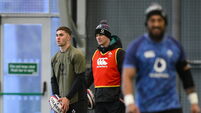The many lives of Brian Carey

OMETIMES he remembers the beginning, or maybe it was the end of the beginning. Brian Carey had already signed with Manchester United but he still had FAI Cup duties to fulfil with Cork City. One of those games stays with him. “Semi-final of the FAI Cup against Bray Wanderers, and in that game a ball came across the park towards me - and went straight under my foot.
“I’ve been thinking about that since beginning work with Tottenham - I’ve thought of who might have been watching me that day and what they thought of that. It comes back to ‘conscious competence’, the difference between being at home in the front garden, throwing the ball on the roof and catching it on the half-volley. Happy, confident, no coach there: in the zone.














